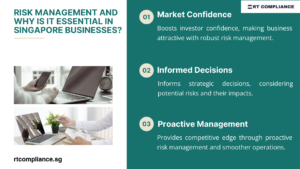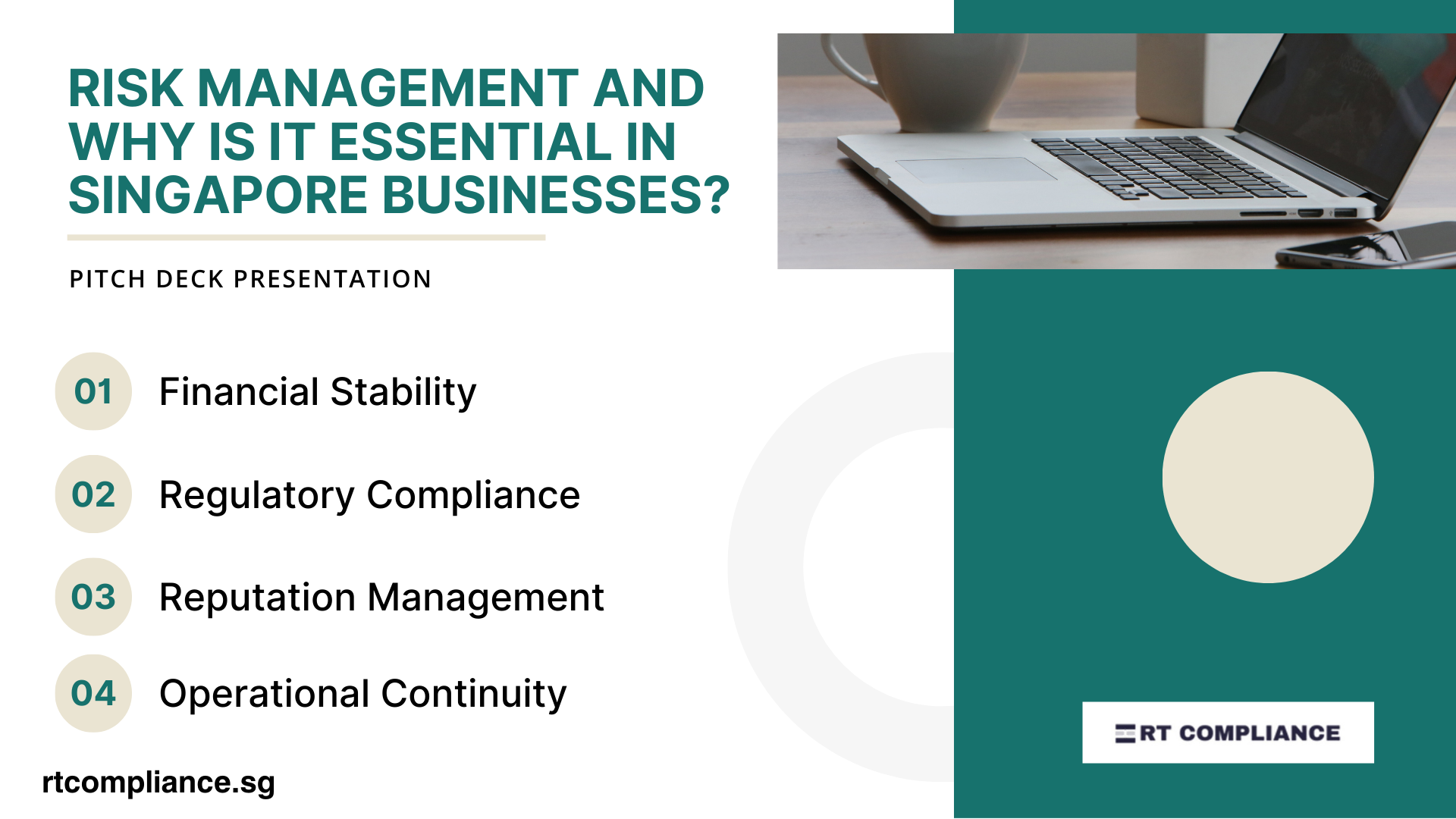Singapore is a global financial center and one of the most important economies in the world. As such, it’s critical for businesses in Singapore to have a robust risk management strategy in place to protect their operations and assets. This article will discuss the risks companies face in Singapore and how they can be mitigated.
Risk Management in Singapore: Why Enterprise Risk Management (ERM) is Essential for Businesses
Risk management in Singapore involves identifying, assessing, and responding to risks. It is an essential component of any business, especially in Singapore’s dynamic environment where Enterprise Risk Management (ERM), regulatory risk management, and financial risk management are vital due to the presence of the Monetary Authority of Singapore (MAS) guidelines.
Types of Risks in Singapore Businesses: From Regulatory to Cybersecurity and ESG Risk Management
Companies in Singapore face various types of risks that can threaten their financial stability, including regulatory risk, technology risk, and operational risk management issues. New laws, MAS risk management guidelines, or shifts in cybersecurity risk management can disrupt business continuity if not addressed proactively. One type of risk is regulatory risk, which occurs when new laws or regulations are enacted that could hurt the company’s business. For example, if the government passes a new environmental rule that requires costly upgrades to the company’s factories, this could put the company at a competitive disadvantage. Another type of risk that companies face is market risk. This type of risk arises when there are changes in the demand for the company’s products or services or when there are changes in the prices of raw materials or other inputs. For example, a sudden decrease in demand for the company’s products could lead to layoffs and other cost-cutting measures. Finally, companies face financial risks, such as interest and currency risks. Interest rate risk occurs when changes in interest rates cause fluctuations in the value of the company’s debt. At the same time, currency risk occurs when changes in the exchange rate between two currencies adversely affect the company’s financial position. Managing these risks is part of running a successful business.
Risk Assessment in Singapore: How to Identify and Manage Operational, Financial, and Strategic Risks
Whether you’re crossing the street or investing in a new venture, it’s essential to identify and assess risks. By taking a few minutes to evaluate the situation, you can minimize the potential for danger or loss. First, identify the potential hazards. These might include traffic crossing the street or financial instability if you’re considering a new investment. Next, think about who is at risk. For example, children are more vulnerable than adults when crossing the road, while retirees may have less time to recover from a setback. Finally, weigh the consequences of taking action. Is the risk of being hit by a car greater than crossing the street? Is the potential return on investment worth the risk of losing your savings? By considering these factors, you can make informed decisions about how to proceed.
Risk Mitigation Strategies in Singapore: From Business Continuity Planning (BCP) to Risk Consulting Services
There is a variety to mitigate or reduce risk. One common approach is purchasing insurance, which can protect the business from financial losses in an accident, natural disaster, or other unforeseen events. Another strategy is establishing risk management procedures, which can help identify and address potential risks before they materialize. Additionally, businesses can often reduce risks by diversifying their operations and investing in hedging instruments. Companies can protect themselves from potentially damaging consequences by taking proactive steps to mitigate or minimize risk.
Future of Risk Management in Singapore: MAS Guidelines, AI, ESG, and Technology Risk Trends in 2025
The risk management landscape in Singapore is constantly evolving in response to changes in the political, economic, social, and technological environment. While the overall risk management framework has remained unchanged, emphasis has shifted from compliance to value creation. This is in line with the changing needs of businesses now looking for ways to add value and improve their competitive position. Future risk management trends are likely to be driven by the continued globalization of business, the rise of new technologies, and the increasing complexity of the business environment. To meet these challenges, organizations must adopt a more holistic approach to risk management that considers all aspects of the organization’s activities.
Comprehensive Risk Management Solutions and Services in Singapore
As part of staying competitive, companies in Singapore are starting to use ISO 31000 with MAS Technology Risk Management (TRM) Guidelines. With the help of these frameworks, companies create a proper process for risk management.
Businesses are seeking guidance from risk management consulting firms in Singapore to create unique solutions involving risk education, software and handling emergency situations. Now that cybersecurity risks are on the rise, companies of all types must focus on both cybersecurity and reputation management.
Since climate risks and attention to ESG are on the rise, all businesses greatly rely on effective ESG risk management. There is growing pressure on companies to consider environmental and social issues when reviewing their financial risks. In this situation, every organization needs a strong BCP to help them be sturdy in the long run.
Selected companies in Singapore use strategic, operational and market risk management to forecast, handle and capitalize on developing threats and new opportunities.






